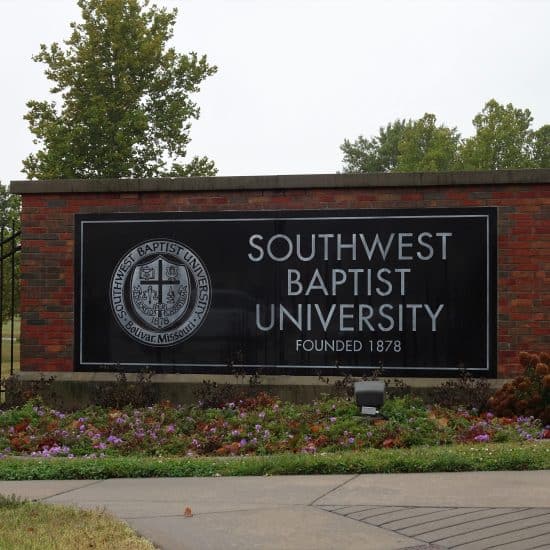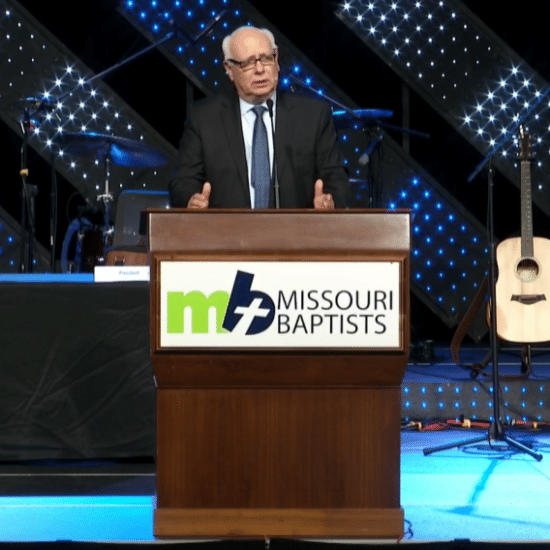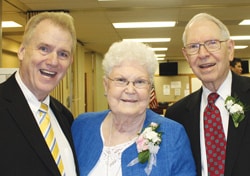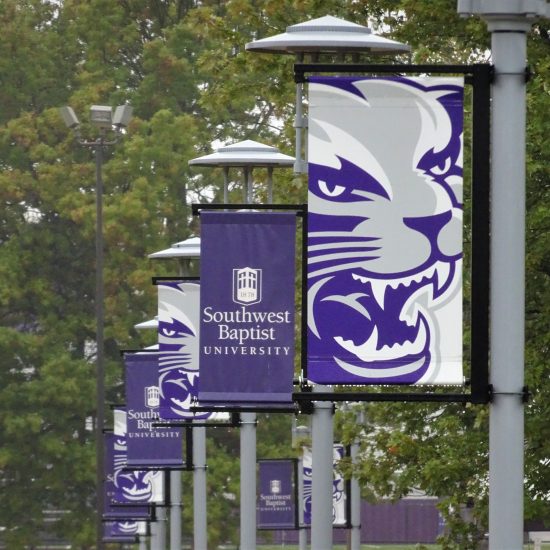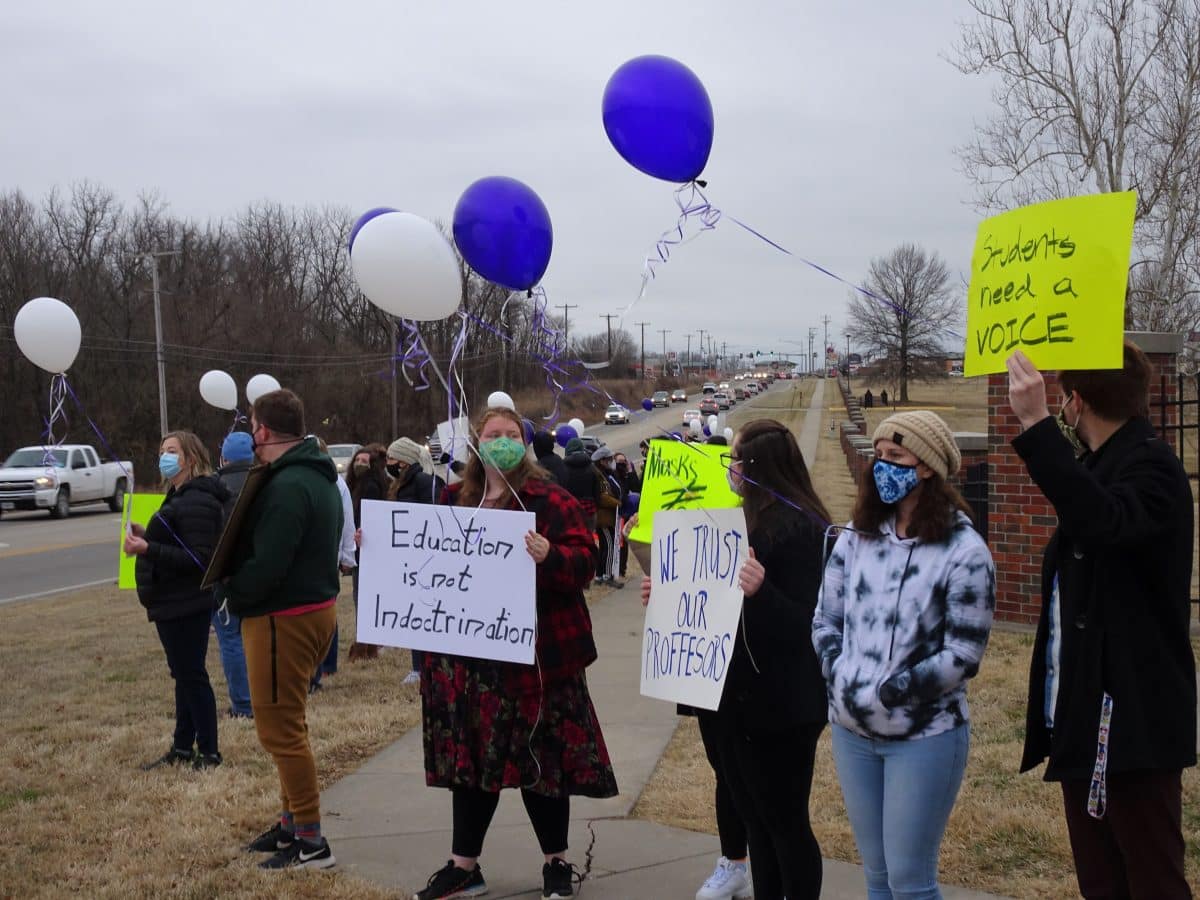
Days after new graduates strutted across the stage at Southwest Baptist University in Bolivar, Missouri, and as several professors packed up their offices on campus for the last time, the chair of the school’s Board of Trustees sent a message to faculty about the ongoing conflict at SBU over control and theology. But the statement from Eddie Bumpers to “provide a greater level of clarity” actually included significant inaccuracies.
Bumpers, the senior pastor at Crossway Baptist Church in Springfield, didn’t explain why he decided to offer “some clarification” about the topics he addressed in the 1,200-word statement, but they seemed to be in response to reporting by Word&Way about trustee actions. Bumpers has repeatedly ignored Word&Way requests for comment and clarification, and the trustees barred Word&Way from the April trustee meeting.
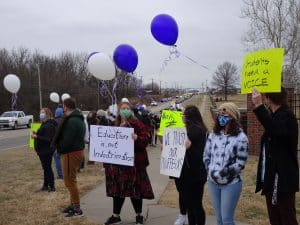
Part of a Feb. 26 rally at Southwest Baptist University to support professors targeted for dismissal by SBU trustees. (Brian Kaylor/Word&Way)
First, Bumpers in his statement to faculty mentioned the school’s new governing documents passed by the Board last year after the Missouri Baptist Convention demanded changes. He noted that the revised Articles still await approval by the Circuit Court of Polk County — something that still hasn’t happened since a former trustee, a professor, and a student filed petitions to block the acceptance of the new Articles. Bumpers then claimed that despite that, new statements of faith for the school “went into effect immediately” last fall because the University’s Bylaws don’t require court approval like the Articles.
Bumpers doesn’t explain why it would matter if the statements of faith went into effect yet. But Word&Way previously reported that the new statements were used to deny tenure or promotion to multiple professors and that the new statements were added to contracts that some faculty and administrators had to sign despite the fact that the Articles have yet to go into effect.
While the new Bylaws do make one mention of the Baptist Faith & Message 2000, the Chicago Statement on Biblical Inerrancy, the Danvers Statement on Biblical Manhood and Womanhood, and the Nashville Statement on human sexuality, it is a passing reference noting that SBU is committed to “providing an environment where those truths are taught and demonstrated by the University’s employees.”
The contractual requirement that the president, provost, and religion professors “annually affirm” those four statements is found not in the Bylaws but the still unapproved Articles. Additionally, the Articles — but not the Bylaws — include the requirement that the rest of the faculty and staff “annually indicate their on-going commitment to perform their duties and teach consistent with and not contrary to the Baptist Faith and Message 2000.”
Bumpers did not respond to Word&Way requests for comment about why the contractual requirements from the Articles were already required for faculty and staff.
Second, Bumpers insisted the new Articles do not change the legal relationship between SBU and the MBC. He claimed the new language designating the MBC as the “sole member” that legally controls the school is merely the same relationship for the school since 1922. To defend this point, he quoted from the definition of “member” from Chapter 355 of the Missouri Revised Statutes.
But SBU is not incorporated under Chapter 355 that governs many nonprofit corporations. Rather, SBU is incorporated — in previous and the revised Articles — under Chapter 352 of the Missouri Revised Statues that governs many religious and charitable associations. As briefs in the Polk County case argue, the concept of a “sole member” violates Chapter 352’s rules about incorporation.
Jonathan Whitehead, one of the MBC’s attorneys, previously explained in an online post that there are important differences between Chapter 355 (nonprofit) and Chapter 352 (benevolent) corporations.
“We have two kinds of ‘nonprofit’ corporations: Benevolent Corporations and Nonprofit Corporations,” he wrote. “Benevolent Corporations have their own set of rules! If you are amending the governing documents for a Benevolent corporation, you should talk to a lawyer who understands the difference!”
Bumpers did not respond to Word&Way requests for comment about why he cited Chapter 355 instead of Chapter 352 as the legal authority for SBU’s Articles.
Third, Bumpers defended the decision to eliminate the philosophy program and the position of the school’s tenured philosophy professor. This move has been criticized by SBU’s Faculty Senate and by the American Association of University Professors for the decision-making process not following the school’s Faculty Handbook and violating academic freedom. Bumpers didn’t respond in his statement to complaints about the process but instead attempted to defend the elimination.
Bumpers claimed the elimination occurred due to “sustainability” changes needed “amidst the COVID-19 pandemic.” He also claimed that “in the spring of 2020, only one student was majoring in philosophy.” But as Word&Way previously reported, the decision to end philosophy came before the official launch of the major. Bumpers attempted to get around that fact by referring to the new major being created in the new philosophy department within the Casebolt College of Music, Arts, and Letters as merely the “revised and renamed” religion and philosophy major in the Redford College of Theology and Ministry. Using that different major in a different department, Bumpers wrote about what he called “the 10-year trend data for Philosophy.”
But not only was the new philosophy major a different program designed with a different focus, but Bumpers also reported numbers he claimed represented recent enrollment in philosophy classes that do not match the actual data. And he did not mention trustee actions taken that limited the new philosophy program’s reach on campus before the program even launched.
Bumpers did not respond to Word&Way requests for comment about the process used to eliminate the philosophy department and faculty position as criticized by the Faculty Senate and the AAUP.
Bumpers ended his statement to the faculty by saying the trustees are “committed to restoring trust and providing clarity across the University, including through our faculty processes.” He did not admit what acts broke the trust that now needs restored.


